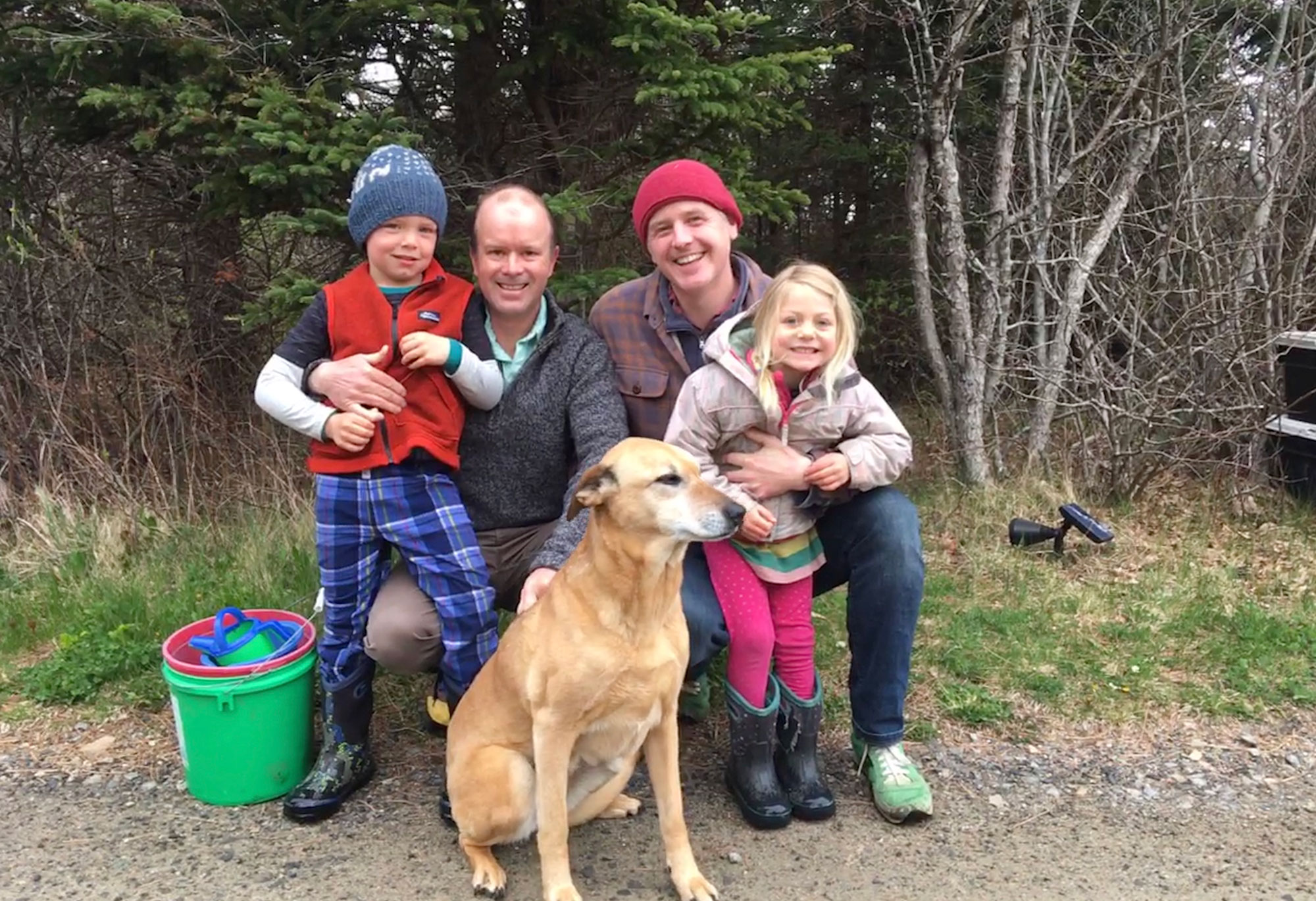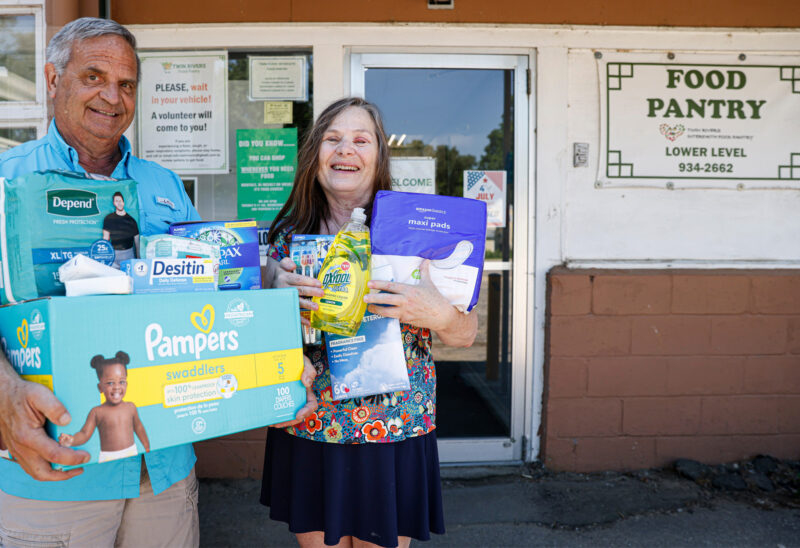William Abbott has joined the Charitable Foundation as a senior philanthropy advisor for the Lakes and North Country regions. He works with generous individuals, families and businesses who want to make a difference for New Hampshire. He comes to the Foundation from the Upper Saco Valley Land Trust, which he directed for a decade. He talks with the Foundation’s Lois Shea about his family’s long agricultural legacies in New Hampshire and in California, the intersection of equity and conservation work and the honesty of conversations that can happen in “purple” towns. He and his husband and their two children live on a farm in North Conway that has been in his husband’s family since before the Revolutionary War.
LS: You went from an English degree as an undergraduate to a Master’s in botany, which leads me to this question: Who are your favorite writers about the natural world and science?
WA: Probably Barry Lopez. And at Wesleyan, I took some classes with Annie Dillard. It was this long, afternoon class where we would meet outside. She was hilarious – quite different from how you would imagine her if you’ve read her books. She had this kind of cult following among the undergrads. I have always been in love with literature and stories, fiction or nonfiction, that are rooted in place. A couple Barbara Kingsolver novels come to mind, and Gary Snyder as a poet.
LS: Your most recent work was directing the Upper Saco Valley Land Trust. That represented a cross-country move for you, from a land trust near your hometown in California. What is different about land conservation in northern New England than in central California?
WA: In California, natural resource conservation is already supported by statewide and county rules and regulations and so land trusts have a smaller niche to fill. Here in New England, control is held at the local level, and land trusts can have a much larger role to play in helping to envision what we want our communities to look like in the future. It’s exciting.
LS: You grew up on a farm in California, where your grandfather also grew up. Tell me the story of that farm.
WA: There are actually two farms, and they are still in the family and right next to each other.
One of my grandfathers was born in 1900 in San Francisco, and went to Davis to study agriculture. He bought the farm in Carpinteria in 1922. It was a walnut and dry beans farm. And it’s still a working farm, planted in avocados and lemons today, managed by my brother and father.
And then mom grew up about a mile away and had three sisters and one brother. The three sisters married neighbors. When we were growing up, it felt like it was all family land. My love of the land is definitely embedded in this sense of history on the land – the stories of the people that came before. For me, this history has also made me feel obligated – in a really good way – to take care of the land for the future. It’s stewardship, and I think my choice to go into the conservation field was a big part of that.
LS: And now you live on another farm that has been in your husband’s family for nine generations. Tell me that story.
WA: David’s middle name is Merrill. His ancestor Thomas Merrill was the first town clerk of Conway. This farm where we live now is a long, skinny lot that goes all way to the Saco River and has good land for growing crops and then steps up onto these alluvial plains, which is where the house is and then behind us is the woodlot and it picks up to foothills of Moat Mountains.
LS: I always ask people their “why New Hampshire” stories – yours must be tied to the farm.
WA: David is a New Englander, and I also have a strong affinity to Northern New Englanders. I feel they are my people. And that word “stewardship” again – I felt compelled to see more nearby land go into conservation, and to help steward his family’s land. I moved here for the job at the Upper Saco Valley Land Trust. It was a challenge I wanted to take on.
Conway’s also a mishmash, politically. It’s a purple town. I like the honesty of conversations that can happen when you are in a purple town.
LS: Tell me about transitioning from a nonprofit that has a singular focus to a community foundation that works across a wide variety of interest areas. Why was that a natural next chapter for you?
WA: I was honored to lead the land trust for the last 10 years and push a lot of initiatives forward and get a lot of wonderful land conserved. One of my focuses at the land trust was to start conserving more land for community’s sake. There has been this shift from conservation just for habitat or water quality perspectives towards community conservation where we can get more people on the land experiencing the land and the joys of open space.
Also, in the last two years, I helped lead an initiative focused on DEI issues [diversity, equity and inclusion] for land trusts, and the Upper Saco Valley Land Trust specifically. Too many people in our communities for too long have felt that they don’t “belong” on conservation properties, which have seemed like refuges for wealthy people. Our goal was to help make sure that everyone in our communities could feel a sense of belonging and connection to the natural world.
One of the projects I am particularly proud of is the Pine Hill Community Forest, which is nearly surrounding Kennett High School. Our two busiest highways, Route 302 and Route 16, flank the community forest. There is a manufactured home community next to the Community Forest, and two more affordable housing developments planned for the same neighborhood. It also fronts on the Saco River. The project scored high in terms of river frontage that was conserved – but more importantly, from the ability to touch so many lives, this was a project that made sense for everyone.
The Pine Hill Community Forest led me to thinking about our community in a new way. That, and just being a full-time resident of the Mount Washington Valley for a decade, and getting to know my neighbors. It became apparent to me how many additional needs our community has. So for me, it was a process of starting to pay attention to a broader perspective.
Joining the Charitable Foundation feels like a natural progression – being embedded in this community and realizing that yes, conservation is super important but there are so many other pressing needs. And to be a fully-fledged member of this community, I feel like we need to be addressing those needs. I’m excited to join the Charitable Foundation team because I think it’s one of the best ways I can be of service to northern New Hampshire.















![Oluwakemi Olokunboyo of Dover received a McNabb scholarship to study nursing at Great Bay Community College [Photo by Cheryl Senter]](https://www.nhcf.org/wp-content/uploads/2024/05/Scholarship-Hero-800x548.jpg)
![Indrika Arnold, Senior Wealth Advisor, the Colony Group [Photo by Cheryl Senter]](https://www.nhcf.org/wp-content/uploads/2024/05/Indrika-Arnold-Hero-800x534.jpg)


